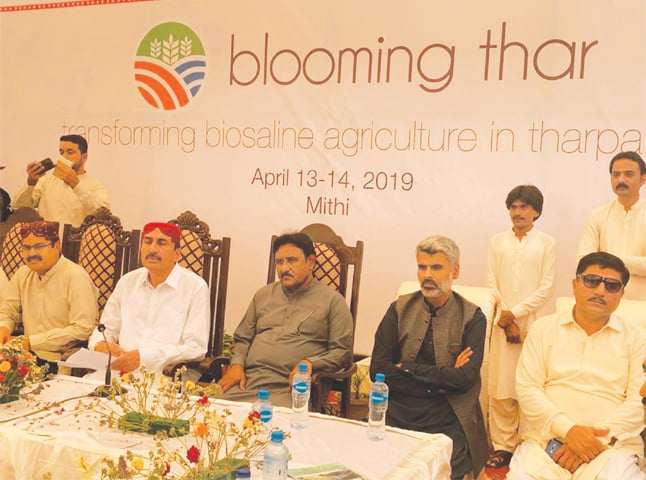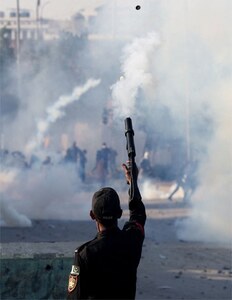
MITHI: Stressing that bio-saline agriculture can bring about an economic revolution, elected representatives, irrigation and agriculture experts, civil society activists and coal mining firms’ executives have urged the government of Sindh to introduce bio-saline agriculture scheme for farmers to eradicate poverty from the region and counter the chronic drought in Thar.
They were speaking at a two-day event titled ‘Blooming Thar: transforming bio-saline agriculture in Tharparkar’ jointly organised by Sindh government, Thar district administration and several non-governmental organisations (NGOs) that started here on Saturday.
The event features an exhibition, seminar and a consultative session, the last one chaired by Sindh Agriculture Minister Ismail Rahu.
Speaking at the opening ceremony, Mr Rahu said that the provincial government was ready to support the initiative which was aimed at combating drought in Thar by introducing bio-saline agriculture on large scale in the desert region. In order to bring about a paradigm shift in the cropping and watering pattern in Tharparkar, farmers should adopt modern irrigation and agriculture methods to produce round-the-year yields without fearing much about droughts, he added.
According to the minister, Sindh accounts for up to 24 per cent of saline land which is suitable for bio-saline agriculture.
He deplored that agriculture in Sindh was being badly affected due to the persisting “terrible water crisis”, and held federal government bodies responsible for non-release of Sindh’s due share of water in the Indus.
According to him, the provincial government is making all-out efforts to bring in latest machinery and introduce modern techniques to give a boost to the agriculture sector despite the fact that the Sindh government is facing a financial crunch due to “callousness” of the federal government.
Mr Rahu vowed to turn Tharparkar into a green land by adopting sustainable policies and plans.
He observed that women of this region could play very important role by laying kitchen gardens in or around their houses. He announced that the provincial government would provide 2,000 kits to Thari women by June this year for the purpose.
MNA Dr Mahesh Kumar Malani in his speech said that several leading NGOs in recent years executed their pilot projects in Thar to ascertain whether bio-saline farming here was possible and the results appeared positive.
“It’s time to act, not only for coal mining and power producing firms but for the Sindh government also; they should come forward and announce a bio-saline agriculture package for farmers of Thar which should include subsidised solar system-based tube wells,” he said.
MPA Faqeer Sher Mohammed Bilalani said that Sindh government should mobilise financial institutions for giving soft or interest-free loans to farmers on a long-term basis so that they could cultivate their lands and gain benefits of bio-saline farming. Dr Mohammad Ismail Kumbhar said it was the need of the hour that Tharis be trained and guided in utilising subsoil water for crop cultivation even in drought conditions.
He referred to a fact sheet to reveal that over the past 114 years, the Thar region had experienced 72 droughts and all of them wreaked havoc on lives and assets of Tharis, besides changing the region’s landscape.
Mohsin Babbar of the Thar Foundation said the experiments of bio-saline farming proved successful as cotton, sunflower, vegetables and different varieties of fodder grew in normal condition. He recalled that fish farming in Gorano dam’s bio-saline pond was another successful model which could be replicated in the region to avail a good source of livelihood.
Rano Mal Dodani, Dr Ghulam Rasool Mahar, Dr Imtiaz Kumbhar, Dr Attaullah, Bhawani Shankar, Mustafa Ujjan and several other experts of their fields also spoke and endorsed the idea that cultivating cash crops and fodder using soil water in Thar’s climate was very much possible and useful.
During the proceedings of the event, Agriculture Minister Ismail Rahu along with other lawmakers, PPP leaders and agriculture experts visited many of the 30 stalls set up at the exhibition.
Published in Dawn, April 14th, 2019






























